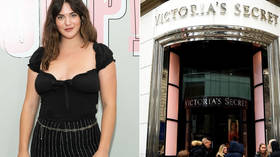All about ‘self-love’? Victoria’s Secret jumps on ‘body-positivity’ bandwagon after losing market-share

Victoria’s Secret is finally embracing the growing ‘body positivity’ movement and hiring its first size-14 model. The decision is ostensibly all about “self-love” and “championing individuality” — but is it really just a PR stunt?
The lingerie brand, famous for its super-skinny models and a long-held commitment to selling “fantasy” rather than reality, hired Ali Tate Cutler as part of a collaboration with UK lingerie company Bluebella. VS didn’t make note of Cutler’s size, however, and fans learned about it from her own Instagram, where she called it a “great step in the right direction for bodies.”
This is exactly the kind of move that usually wins companies quick praise, but with its reputation (and bottom line) suffering due to a lack of diversity in its model and product line-ups, the decision to hire Cutler looks like a transparent attempt to grab back some of the market share it lost by steadfastly refusing to jump on the bandwagon sooner.
Also on rt.com Is political correctness killing fashion? Designers are speaking up against the ‘tyranny’ of the wokeJust weeks ago, the company went for another PR win and hired its first transgender model, Valentina Sampaio. The sudden shift from fantasy to reality coincided with the recent departure of longtime chief marketing officer Ed Razek, who took heat last year for saying the company should not hire “transsexuals” and that customers had essentially “no interest” in seeing plus-sized models. “We market to who we sell to, and we don’t market to the whole world,” Razek said.
Yet, with the 71-year-old Razek gone, the company seems to have decided that actually, they do want to market to the whole world — and that probably has more than a little to do with the fact that it has been losing money, rather than a sudden desire to embrace individuality and “self-love.”
The trouble for VS started as more body-positive brands like Aerie and ThirdLove started appearing on the scene, leading its US market share to drop from 33 percent to 24 percent between 2016 and 2018. Same-store sales were down by three percent in 2018.
Also on rt.com Fashion victims: 5 times clothing giants profited from cultural appropriationIts once hugely popular teen-focused Pink line has also been suffering, apparently due to overly sexy ads which are not loved by parents. A survey of teen spending habits and favored clothing brands last year saw VS slip out of the top 10 ranking altogether. In worse news, it found itself on the list of top 10 brands teens don’t shop from a second time.
It may not just be the brand’s objection to political correctness that has caused its problems, however. In addition to being repeatedly condemned for failing to move with the times, VS has also been accused of letting the quality of its products slip.
Victoria’s dirty secret is that the quality of their products went down the drain the last few years and are cheaply made, yet they still managed to jack up their prices to stay in the market. https://t.co/4cYwnAISra
— 𝗰𝗮𝗿𝗹𝗮𝗺𝗮𝗲 🍂 (@carlaxmaee) August 24, 2019
Things began to look even more precarious when the infamous annual VS fashion show was cancelled this year after fewer people than ever tuned in to watch in 2018. The broadcast hit a record low of 3.3 million viewers, compared to five million the year before. In an internal memo, VS parent L Brands CEO Les Wexner said television was no longer “the right fit” for the company.
Shareholders have started to worry, too. Activist investor Barington Capital scolded VS in a letter last March for its “outdated” and even “tone deaf” image that had failed to align with women’s “evolving attitudes” toward beauty. Indeed, it turns out that most women want comfortable underwear and neutral colors and designs more than they want to imagine themselves in diamond-encrusted “fantasy bras.”
The question for Victoria’s Secret now is whether turned-off customers will be won over by its attempt to redeem itself, or will its latest efforts be seen as nothing more than sheer hypocrisy?
Like this story? Share it with a friend!














